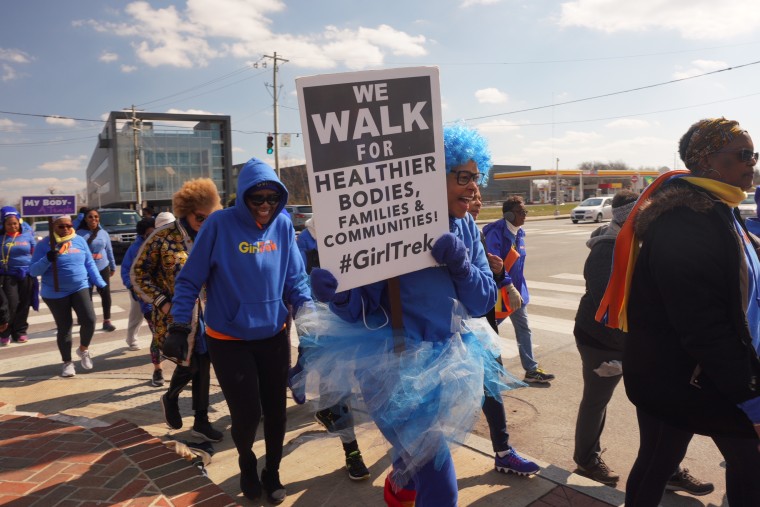Braving snow flurries, rain and sleet, a group of women walked 100 miles in five days to pay homage to civil rights activist Harriet Tubman and raise awareness about health disparities impacting African-Americans.
Members of GirlTrek—a national organization devoted to health and wellness for black women and girls— have paid respect to Tubman since 2013. The organization has mobilized thousands of women nationwide to walk in her honor. This year, to commemorate the 105th anniversary of Tubman’s death (March 10, 1913), the group planned a journey that they dubbed #HarrietsGreatEscape.

“We realized that we can’t just talk the talk,” said GirlTrek co-founder, T. Morgan Dixon. “Harriet Tubman saved her own life first and then went back, time after time, to save the lives of others giving us the blueprint for the work [we] do today. This is radical self-care at its core.”
The walk began on Maryland’s Eastern Shore, where Araminta Ross (who became Tubman after marriage) was born circa 1822 on a Dorchester County farm. After escaping bondage in 1849 while in her late 20s, historians say the woman known as the “Moses” of her people, returned multiple times to Maryland to shepherd relatives and other African-Americans to freedom in the North via the Underground Railroad.
“Harriet overcame numerous obstacles,” said Dana Paterra, manager of the Harriet Tubman Underground Railroad State Park.
Harriet Tubman saved her own life first and then went back, time after time, to save the lives of others giving us the blueprint for the work [we] do today. This is radical self-care at its core.
The park opened last year in Maryland and is operated in tandem with the National Park Service. The 17-acre site has already drawn some 100,000 tourists from around the world.
“We were excited about the women walking,” Paterra said of GirlTrek. “Our rangers and team came out to cheer them on. They're inspiring.”
Buoyed by Tubman’s legacy, the women of GirlTrek followed a mapped out path along the Harriet Tubman Underground Railroad Byway, a drivable route which runs through both Maryland and Delaware. The walkers covered nearly 20 miles daily—sometimes along busy highways--staying overnight at local motels.
Despite being physically and mentally challenged every step of the way, participants—who hailed from across the country- told NBC BLK that Tubman’s inspiration and their faith kept them going.
“Everyone’s feet are aching, we’re sore, but we made it,” said GirlTrek spokeswoman Jewel Bush. “We met so many amazing people along the way. They honked their horns, cheered, pulled over to give us hugs. One older white gentleman, who heard about our walk on a Christian radio station, brought us bottled water from his truck. It was touching.”
GirlTrek aims to motivate Black women and girls to walk for better health, an act they believe can save a community disproportionately dealing with health disparities than other groups.
According to the CDC, African-American women have the highest rates of being overweight or obese compared to other groups in America. Data shows four out of five are overweight.
“Now, it is even more important that [we] work to re-establish walking as a healing tradition,” said GirlTrek co-founder, Vanessa Garrison. “We believe that, as women, we are going to have to also liberate, one, ourselves and then come back and be examples and liberate our family. If Harriet Tubman could walk herself to freedom, we can certainly walk ourselves to better health.”
Dr. Doris Browne is president of the National Medical Association, the nation’s largest and oldest organization of black physicians. The NMA hosted a colloquium last week in the nation’s capital that drew experts from around the country.
Browne told NBC BLK that it is “imperative” black women actively address health issues such as heart disease, diabetes and hypertension.
She recommended lifestyle changes such as diet and exercise, reducing stress, and getting at least 7-8 hours of sleep. Browne added that it’s important to visit a physician or certified health care professional to seek the type of personal information that can save one’s life.
“You should have a physical, and get weighed," Browne said. "[Doctors] will do a battery of tests. Ask [for] your cholesterol, glucose, blood pressure numbers. Have your thyroid checked, have a mammogram and colonoscopy.”
The GirlTrek journey ended with walkers crossing the Mason Dixon Line into Delaware on Saturday. Dozens of women had flown in from around the country to greet them at a public celebration held at the Tubman Garrett Riverfront Park in Wilmington.
Stand in your power and recognize you are equipped. We honor the women around us and those that went before us when we walk in that strength.
Walkers such as Chyna Johnson, 27, from Ohio, said the walk gave her a sense of accomplishment and hopes it willinspire others.
“Stand in your power and recognize you are equipped. We honor the women around us and those that went before us when we walk in that strength.”
Onika Jervis, a native of Guyana who currently lives in New Orleans agreed.
“This historic trip has allowed me to push my mind and body to be free, Jervis said. “Every step of the way I have reflected on the conditions that Harriet faced while walking alone, without a team of friends and knowing that if captured her life would be in jeopardy.”
Just as Tubman was an abolitionist, Civil War spy and nurse, suffragist, and humanitarian during her lifetime, Jervis said the walk was meant to encourage the countless women serving their communities.
“I believe it's crucial for us to put our self-care first then go back to bring our friends, family.”